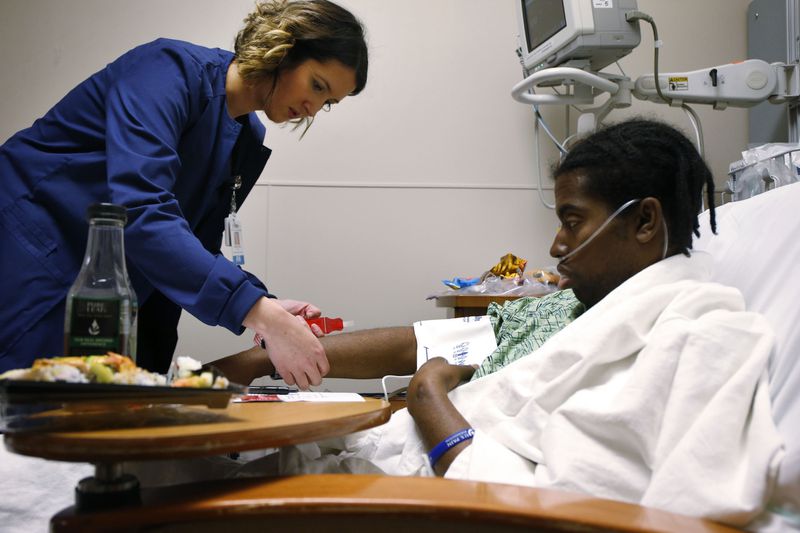DISCLAIMER
The information and materials accessed through or made available for use on any of our Sites, including, any information about diseases, conditions, treatments, or medicines, are for informational purposes only. The Content is not intended to be and is not a substitute for professional medical advice, diagnosis, or treatment, and your participation on our Sites does not create a healthcare professional-patient relationship. You should consult a doctor or other qualified health care professional regarding any questions you have about your health or before making any decisions related to your health or wellness. Call your doctor or 911 immediately if you think you may have a medical emergency.compose your message
message sent
email sent successfully
Trusted Resources: News & Events
Latest announcements and gatherings
Sickle cell disease is complex on its own, but black men with the illness battle its stigmas and stereotypes too
Doctors didn’t expect Marqus Valentine to live past age 5. The prognosis was so certain that the Valentine family was granted a free trip to Universal Studios to the set of “The Ghostbusters” from a foundation as a dying wish.
Although Valentine beat those odds, his troubles didn’t stop. Diagnosed with sickle cell disease as a baby, he repeated kindergarten because of missing a lot of school due to lengthy hospitalizations and even had a stroke in fourth grade during class, he said.
Growing up during the height of the AIDS epidemic, his classmates didn’t want to play with him because they thought Valentine was contagious. Invitations to birthday parties stopped, and as he got older, he spent the rest of his childhood years receiving monthly blood transfusions, as well as other treatments.
“My peers, no one understood sickle cell,” said Valentine.
The disease is complex physiologically, manifesting itself differently in every carrier, but also sociologically, bringing in factors like racial bias, since sickle cell is believed to be most common among minority groups, particularly African Americans. Historically, there has been limited funding and research dedicated to sickle cell disease, evidenced by only one FDA-approved drug available to the community until last month. The landscape for adults who have sickle cell is much harder than that for children with the illness, and black men specifically may have a harder time dealing with the condition because of existing stereotypes preceding them. A lack of resources for a disease that primarily affects a marginalized community, coupled with negative perceptions of African American males, can exacerbate the navigation of an already complicated, painful disease.

 +myBinder
+myBinderRelated Content
-
news & eventsWarrior University: Curative Therapies SeriesWarrior University is an online, curricu...
-
people & placesNorth Alabama Sickle Cell Foundation (NASCF)North Alabama Sickle Cell Foundation's (...
-
education & researchData & Statistics on Sickle Cell DiseaseSickle cell disease (SCD) affects millio...
-
education & researchImpact of Spiritual Counseling for African American Young Adults with Sickle Cell DiseaseThis spiritual intervention addresses th...
-
people & placesJames R. Clark Memorial Sickle Cell FoundationThe James R. Clark Memorial Sickle Cell ...
-
news & events10th Year Anniversary Celebration by The Sickle Cell Association of New JerseyThe Sickle Cell Association of New Jerse...
-
news & eventsNational Sickle Cell Awareness MonthSeptember is National Sickle Cell Awaren...
send a message
To improve your experience on this site, we use cookies. This includes cookies essential for the basic functioning of our website, cookies for analytics purposes, and cookies enabling us to personalize site content. By clicking on 'Accept' or any content on this site, you agree that cookies can be placed. You may adjust your browser's cookie settings to suit your preferences. More Information
The cookie settings on this website are set to "allow cookies" to give you the best browsing experience possible. If you continue to use this website without changing your cookie settings or you click "Accept" below then you are consenting to this.
Support for this site is provided by

This platform is made possible through a partnership with the Sickle Cell Disease Association of America, Inc. (SCDAA) and its member organizations. SCDAA's mission is to advocate for people affected by sickle cell conditions and empower community-based organizations to maximize quality of life and raise public consciousness while advancing the search for a universal cure.




